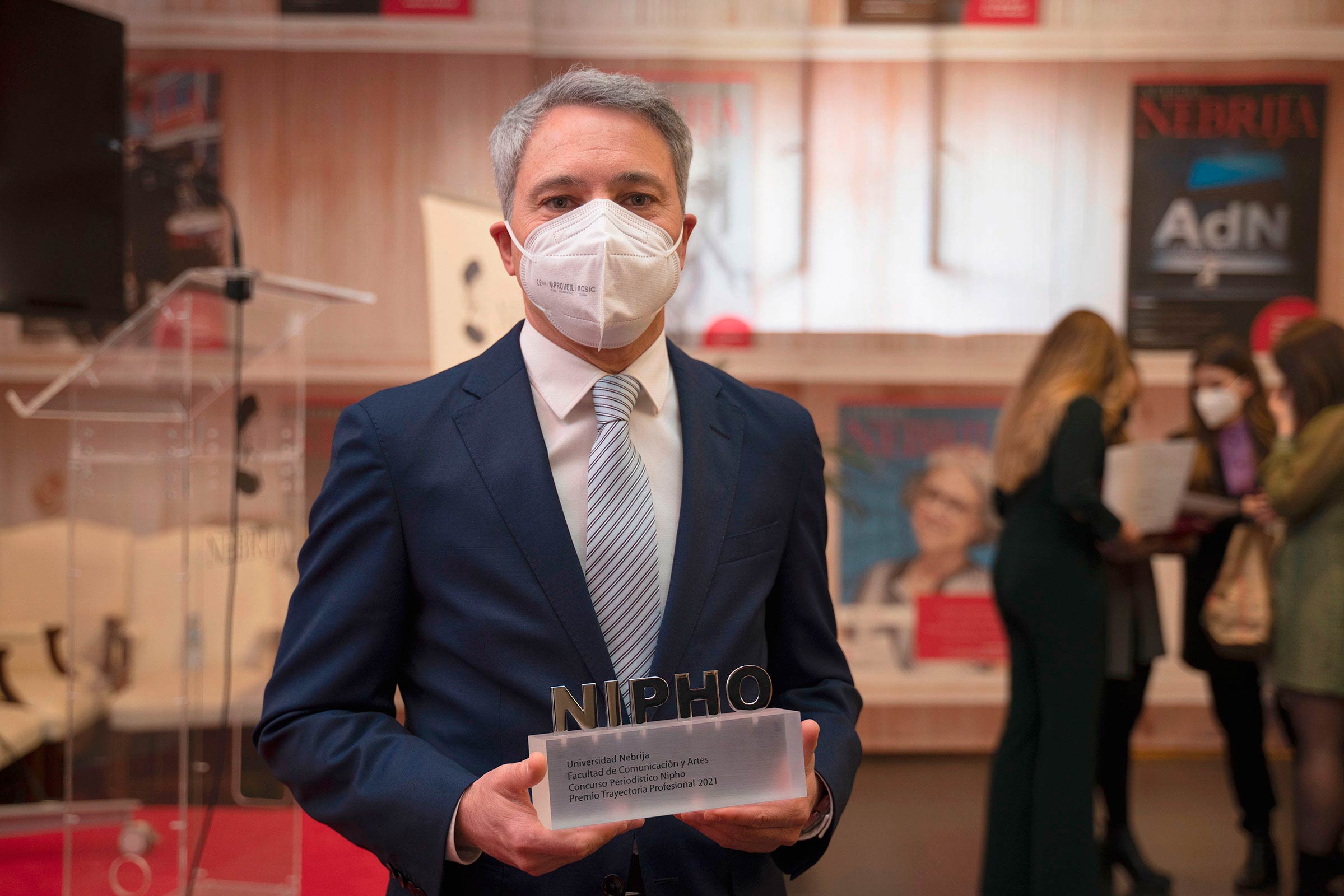Bachelor's Degree in Journalism
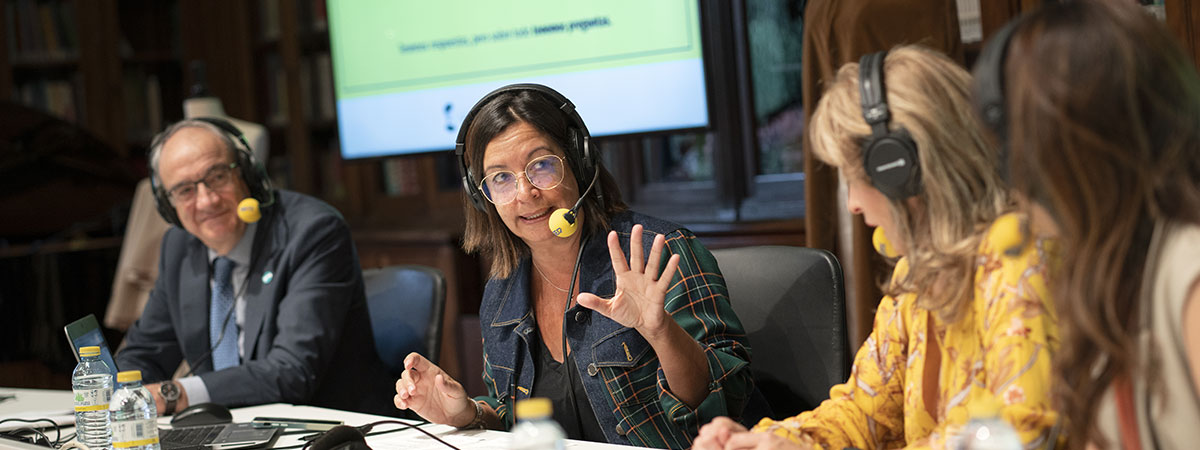
Top-level facilities
We live in complex, changing and uncertain times, but also exciting ones. In the midst of the digital age, where society feels vulnerable in the face of misinformation and polarization, journalism emerges again as a guarantor of the truth and as a support for democracies. Journalism has the opportunity to renew its commitment as a public service and for this the university has the obligation to provide future professionals with the necessary skills and abilities to meet these challenges. And this is the objective that Nebrija University's Bachelor's Degree in Journalism has set itself.
Through a renewed and well-structured curriculum, we want to train future communicators to develop their professional careers in multiple fields related to the world of communication and information, as well as in companies and institutions that are part of our economy. Therefore, we highlight a triple path of employability that responds to what employers are demanding of us:
On the one hand, from Nebrija University we provide them with the ability to work in the media, on television and radio, in the new audiovisual and sound formats; in traditional print media and digital media. We also make future Nebrija journalists digital experts, specialized in data management, social networks and new informative narratives, which will allow them to work with multidisciplinary teams and in business fields beyond the media.
Read +And at the same time we train them to manage corporate and institutional communication effectively, so that they can contribute and help companies or public institutions to connect and communicate in a solid manner with their stakeholders.
All this with an experienced, professional, innovative and research faculty of top-rated professors, which is necessary to provide students with the perfect balance between the practical knowledge that this profession requires and the critical spirit, cultural heritage and reflective and investigative ability that all journalists must possess to face their work.
Read lessThe professor of Communication Management, Carmen Torres, explains why we should study for the Bachelor's Degree in Journalism at Nebrija.
Practical training from day one
Curriculum
BOE no. 65 of March 17, 2014
Our degree course structure has been drawn up in accordance with the new guidelines established by current legislation and verified by the National Agency for Quality Assessment and Accreditation (ANECA).
The student must complete 240 credits
First year 60 ECTS
First semester 30 ECTS- 6 ECTS | Communication Industries
- 6 ECTS | Literature and creation
- 6 ECTS | Ethics and Conduct in Communication
- 6 ECTS | Journalistic Writing I
- 6 ECTS | Skills Development Seminar I
Second semester 30 ECTS- 6 ECTS | Journalistic Writing II
- 6 ECTS | FotoJournalism
- 6 ECTS | Right to information
- 6 ECTS | New Technologies and the Information Society
- 6 ECTS | History and national news
Second year 60 ECTS
First semester 30 ECTS- 6 ECTS | Journalistic Writing for Digital Media
- 6 ECTS | Camera
- 6 ECTS | Sociology
- 6 ECTS | Editing and Montage
- 6 ECTS | Applied economics
Second semester 30 ECTS- 6 ECTS | Design for Journalism
- 6 ECTS | Media, Art and Culture
- 6 ECTS | Presenting and Voice-Over
- 6 ECTS | History and international news
- 6 ECTS | Skills Development Seminar II
Third year 60 ECTS
First semester 30 ECTS- 6 ECTS | Institutional Communication
- 6 ECTS | Writing and Editing for Digital Media
- 6 ECTS | TV Workshop
- 6 ECTS | Specialised Journalism I
- 6 ECTS | Development of Interpersonal Involvement and Solidarity
Second semester 30 ECTS- 6 ECTS | Radio Workshop
- 6 ECTS | Specialised Journalism II
- 18 ECTS | Skills Assessment in Business
Fourth year 60 ECTS
First semester 30 ECTS- 6 ECTS | Programming and Digital Design
- 6 ECTS | Management of Online Communities
- 6 ECTS | Spokesperson Training and Media Relations
- 6 ECTS | Research Methods in Communication
- 6 ECTS | Skills Development Seminar III
Second semester 30 ECTS- 6 ECTS | Digital Journalism and Data Analysis
- 6 ECTS | Brand journalism
- 6 ECTS | Modern Languages
- 12 ECTS | End of Degree Project
More information on these subjects
- 6 ECTS | Communication and Emotional Intelligence

- 6 ECTS | Teamwork and Project Management

- 6 ECTS | Leadership and Negotiation

The recognition of 6 credits will be assessed depending on the different activities that the student performs throughout his degree. They will be awarded for university cultural activities, sports, student representation, solidarity and cooperation, or for taking one of the following subjects: Ethics of volunteering or Human Rights.
The aim of this programme is to support students' on-the-job training under the ongoing supervision of the University's Professional Careers Department, the academic department responsible for awarding the degree, and the partner company or institution where the internship takes place. You will be advised on how best to choose your internship, and will be monitored and tutored on an ongoing basis, with a view to your own professional interests.
Further information on internships List of companies intershipsThe final research project involves researching a topic or creating a practical professional initiative on the student's own motion, under the supervision of one or more Department academic staff and, sometimes, professionals in the business world.
Through the transversal subjects you will be able to complement your education and complete your CV in a practical, collaborative and fun way.
It is a voluntary program with no added cost. Upon completion, you will be provided with a diploma.
Access all the informationNebrija University, which is committed to languages and quality, provides the student with added value with the Diploma in English Professional Communication, which will allow him/her to achieve with confidence the competence demanded to successfully join the labor market.
It corresponds to level C1.
More information hereProfessors
| Profesores Professors | Porcentaje de Doctores Percentage of PhD holders |
| 34 | 61,8% |
 Eduardo Castillo Lozano
Director del Grado en Periodismo. Profesor de Redacción Periodística I y Presentación y locución
Director of the Degree in Journalism. Professor of Journalistic Writing I and Presentation and locution
Director del Grado en Periodismo de la Universidad Nebrija. Doctor en Comunicación Audiovisual por la UCM. Licenciado en Periodismo por la Universidad San Pablo CEU de Madrid. Máster en Información Económica APIE (Asociación de Periodistas de Información Económica) por UCM. Actualmente compagina su labor en la dirección académica del Grado con el ejercicio profesional en Capital Radio, emisora especializada en economía donde dirige y presenta programas especializados en empresa y tecnología. En 2017 recibió la Antena de Oro en la categoría de radio por esta actividad. Profesional del periodismo con más de veinte años de experiencia en medios escritos, televisivos y radiofónicos, así como en asesorías de comunicación, ha presentado programas de televisión en RTVE, Telemadrid y Canal 9 y ha desempeñado cargos de redactor jefe y subdirector en La Gaceta de los Negocios. Actualmente imparte clases de Redacción Periodística, Periodismo Especializado, de Locución y Presentación y de Taller de Locución en el Máster en Formación Permanente en Radio, Podcast y Audio digital Nebrija-Cadena SER.
Eduardo Castillo Lozano
Director del Grado en Periodismo. Profesor de Redacción Periodística I y Presentación y locución
Director of the Degree in Journalism. Professor of Journalistic Writing I and Presentation and locution
Director del Grado en Periodismo de la Universidad Nebrija. Doctor en Comunicación Audiovisual por la UCM. Licenciado en Periodismo por la Universidad San Pablo CEU de Madrid. Máster en Información Económica APIE (Asociación de Periodistas de Información Económica) por UCM. Actualmente compagina su labor en la dirección académica del Grado con el ejercicio profesional en Capital Radio, emisora especializada en economía donde dirige y presenta programas especializados en empresa y tecnología. En 2017 recibió la Antena de Oro en la categoría de radio por esta actividad. Profesional del periodismo con más de veinte años de experiencia en medios escritos, televisivos y radiofónicos, así como en asesorías de comunicación, ha presentado programas de televisión en RTVE, Telemadrid y Canal 9 y ha desempeñado cargos de redactor jefe y subdirector en La Gaceta de los Negocios. Actualmente imparte clases de Redacción Periodística, Periodismo Especializado, de Locución y Presentación y de Taller de Locución en el Máster en Formación Permanente en Radio, Podcast y Audio digital Nebrija-Cadena SER.
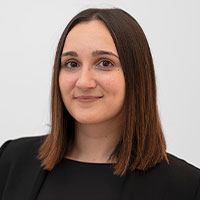 Tania Brandariz Portela
Profesora de Comunicación institucional
Professor of Institutional Communication
Doctora en Periodismo por la Universidad Complutense de Madrid. Máster Universitario en Estudios Avanzados en Comunicación Política. Como Colaboradora Honorífica en la Universidad Complutense de Madrid, ha impartido sesiones sobre Sociología, Opinión Pública y Comunicación Política y Género en los grados en Periodismo, Comunicación Audiovisual y Publicidad y Relaciones Públicas y en el Máster en Estudios Avanzados en Comunicación Política.
Investiga sobre los marcos de interpretación políticos del feminismo y el anti-feminismo, publicando artículos científicos y capítulos de libro sobre la temática. Pertenece al grupo de investigación Produsage cultural en redes sociales y Estudios literarios y culturales y estudios de género, en la Universidad Complutense de Madrid. Por otro lado, ha colaborado con European Journalism Observatory, The Conversation y la Revista de la Asociación de Comunicación Política. Profesora de Marketing Online y de Herramientas TIC en el Máster en Marketing y Publicidad Digital, Universidad Nebrija. Se ha desempeñado como periodista digital en Nós Televisión, La Voz de Galicia y La Mirada Común.
Tania Brandariz Portela
Profesora de Comunicación institucional
Professor of Institutional Communication
Doctora en Periodismo por la Universidad Complutense de Madrid. Máster Universitario en Estudios Avanzados en Comunicación Política. Como Colaboradora Honorífica en la Universidad Complutense de Madrid, ha impartido sesiones sobre Sociología, Opinión Pública y Comunicación Política y Género en los grados en Periodismo, Comunicación Audiovisual y Publicidad y Relaciones Públicas y en el Máster en Estudios Avanzados en Comunicación Política.
Investiga sobre los marcos de interpretación políticos del feminismo y el anti-feminismo, publicando artículos científicos y capítulos de libro sobre la temática. Pertenece al grupo de investigación Produsage cultural en redes sociales y Estudios literarios y culturales y estudios de género, en la Universidad Complutense de Madrid. Por otro lado, ha colaborado con European Journalism Observatory, The Conversation y la Revista de la Asociación de Comunicación Política. Profesora de Marketing Online y de Herramientas TIC en el Máster en Marketing y Publicidad Digital, Universidad Nebrija. Se ha desempeñado como periodista digital en Nós Televisión, La Voz de Galicia y La Mirada Común.
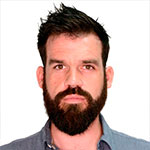 Ignacio Calle Fernández
Profesor de Periodismo digital y análisis de datos
Professor of digital journalism and data analysis
Licenciado en Periodismo por la Universidad Rey Juan Carlos. Periodista de datos e investigación, especializado en fact-checking.
Premio Pulitzer 2017 como parte del equipo que desveló los Papeles de Panamá.
Premio al Mejor Periodista 2017 de la Asociación de la Prensa de Madrid (APM).
En la actualidad es Subdirector en Maldita.es.
Entre 2015 y 2018 fue periodista de investigación y coordinador de datos en laSexta, participando en la investigación sobre los Papeles de Panamá, Bahamas Leaks, Paradise Papers e Implant Files.
También ha integrado el equipo de Comunicación de Patrimonio Nacional (2011-2015), desarrollando proyectos multimedia, coordinando el portal web institucional, etc. En esta institución fue responsable de la implantación de redes sociales.
De su experiencia como docente destaca su labor como profesor en el Máster en Periodismo de Investigación, Datos y Visualización (Universidad Rey Juan Carlos), así como los talleres impartidos en numerosas universidades, entre ellas la Universidad Nebrija, el San Pablo CEU, el Centro Universitario Villanueva, la UCM, la Universidad Europea y la Universidad Francisco de Vitoria.
Cualificación académica: Licenciado en Periodismo, Universidad Rey Juan Carlos, 2009. Máster de Protocolo y organización de eventos, UNED, 2012. Máster en Periodismo de Investigación, Datos y Visualización, Universidad Rey Juan Carlos-Unidad Editorial, 2014.
Es miembro fundador y secretario de la Asociación de Periodistas de Investigación (API).
Ignacio Calle Fernández
Profesor de Periodismo digital y análisis de datos
Professor of digital journalism and data analysis
Licenciado en Periodismo por la Universidad Rey Juan Carlos. Periodista de datos e investigación, especializado en fact-checking.
Premio Pulitzer 2017 como parte del equipo que desveló los Papeles de Panamá.
Premio al Mejor Periodista 2017 de la Asociación de la Prensa de Madrid (APM).
En la actualidad es Subdirector en Maldita.es.
Entre 2015 y 2018 fue periodista de investigación y coordinador de datos en laSexta, participando en la investigación sobre los Papeles de Panamá, Bahamas Leaks, Paradise Papers e Implant Files.
También ha integrado el equipo de Comunicación de Patrimonio Nacional (2011-2015), desarrollando proyectos multimedia, coordinando el portal web institucional, etc. En esta institución fue responsable de la implantación de redes sociales.
De su experiencia como docente destaca su labor como profesor en el Máster en Periodismo de Investigación, Datos y Visualización (Universidad Rey Juan Carlos), así como los talleres impartidos en numerosas universidades, entre ellas la Universidad Nebrija, el San Pablo CEU, el Centro Universitario Villanueva, la UCM, la Universidad Europea y la Universidad Francisco de Vitoria.
Cualificación académica: Licenciado en Periodismo, Universidad Rey Juan Carlos, 2009. Máster de Protocolo y organización de eventos, UNED, 2012. Máster en Periodismo de Investigación, Datos y Visualización, Universidad Rey Juan Carlos-Unidad Editorial, 2014.
Es miembro fundador y secretario de la Asociación de Periodistas de Investigación (API).
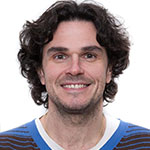 Javier Chivite Fernández
Profesor de Formación de portavoces y relaciones con los medios
Speaker Training and Media Relations professor
Doctor en Periodismo por la Universidad Complutense de Madrid. Acreditado por ACAP. Licenciado en Periodismo, es profesor universitario desde el año 2005. Ha trabajado en la cadena COPE, en la diputación de Toledo y en Radio Intercontinental. En la actualidad, es portavoz del Centro de Emergencias 112 de la Comunidad de Madrid, colaborando en la gestión de la comunicación en situaciones de crisis y emergencias como la nevada que originó la borrasca Filomena, incendios forestales y fenómenos meteorológicos adversos. Está en posesión de la Medalla al Mérito de Protección Civil en la categoría de Bronce y con distintivo Blanco concedida por la Dirección General de Protección Civil y Emergencias del Ministerio del Interior en 2018 al equipo de comunicación de Emergencias 112 Comunidad de Madrid.
Javier Chivite Fernández
Profesor de Formación de portavoces y relaciones con los medios
Speaker Training and Media Relations professor
Doctor en Periodismo por la Universidad Complutense de Madrid. Acreditado por ACAP. Licenciado en Periodismo, es profesor universitario desde el año 2005. Ha trabajado en la cadena COPE, en la diputación de Toledo y en Radio Intercontinental. En la actualidad, es portavoz del Centro de Emergencias 112 de la Comunidad de Madrid, colaborando en la gestión de la comunicación en situaciones de crisis y emergencias como la nevada que originó la borrasca Filomena, incendios forestales y fenómenos meteorológicos adversos. Está en posesión de la Medalla al Mérito de Protección Civil en la categoría de Bronce y con distintivo Blanco concedida por la Dirección General de Protección Civil y Emergencias del Ministerio del Interior en 2018 al equipo de comunicación de Emergencias 112 Comunidad de Madrid.
 Celestino Díaz Tristán
Profesor de Diseño Web
Professor of Web Design
Es técnico superior de Imagen y Sonido (Escuela de Imagen y Sonido de Almería), licenciado en Comunicación Audiovisual (Universidad de Málaga), máster en Diseño Gráfico (Gauss Multimedia), máster de Radio en RNE (Instituto RTVE y Universidad Complutense de Madrid), máster en UX, UI y Product Design (Neoland) y MBA (The Power MBA). Ha trabajado como redactor y fotógrafo del periódico La Voz de Almería y como director, presentador, redactor y productor de programas de Radio y TV en InteralmeríaTV, Cadena SER Almería, RNE, Radio5, Radio3 y Cad ena COPE. Desde 2014 trabaja como diseñador gráfico en COPE, ampliando funciones de experiencia de usuario en 2016 y siendo nombrado en 2018 Director de Diseño de Producto (UX-UI) e Innovación del Grupo COPE, actual Ábside Media (COPE, Cadena100, Rock FM, Megastar FM y TRECE). En 2021 funda Borani, un estudio de diseño y experiencia de usuario especializado en medios de comunicación y plataformas de contenido audiovisual.
Celestino Díaz Tristán
Profesor de Diseño Web
Professor of Web Design
Es técnico superior de Imagen y Sonido (Escuela de Imagen y Sonido de Almería), licenciado en Comunicación Audiovisual (Universidad de Málaga), máster en Diseño Gráfico (Gauss Multimedia), máster de Radio en RNE (Instituto RTVE y Universidad Complutense de Madrid), máster en UX, UI y Product Design (Neoland) y MBA (The Power MBA). Ha trabajado como redactor y fotógrafo del periódico La Voz de Almería y como director, presentador, redactor y productor de programas de Radio y TV en InteralmeríaTV, Cadena SER Almería, RNE, Radio5, Radio3 y Cad ena COPE. Desde 2014 trabaja como diseñador gráfico en COPE, ampliando funciones de experiencia de usuario en 2016 y siendo nombrado en 2018 Director de Diseño de Producto (UX-UI) e Innovación del Grupo COPE, actual Ábside Media (COPE, Cadena100, Rock FM, Megastar FM y TRECE). En 2021 funda Borani, un estudio de diseño y experiencia de usuario especializado en medios de comunicación y plataformas de contenido audiovisual.
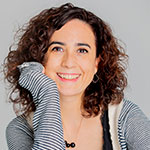 Ianire Doistua Pimintel
Profesora de Escritura creativa
Professor of creative writing
Licenciada en Publicidad y Relaciones Públicas con Especialización en Creatividad por Universidad Antonio de Nebrija, con Curso de Especialización en Enseñanza de Escritura Creativa por Universidad de Alcalá y Escuela de Escritores y Máster de Narrativa por Escuela de Escritores. Creativa publicitaria (copywriter) en agencias como McCann y Shackleton y profesora de escritura en Escuela de Escritores. Elegida por Woman (El Periódico) como una de las cinco autoras revelación de 2021 por su novela Una casa de verdad (Tres hermanas, 2021), la cual también fue destacada por El Cultural como una de las ocho mejores novelas debut de 2021. Asimismo, ha publicado el álbum infantil Pan con aceite y miel (Libros.com, 2020) y relatos breves en diversas antologías y revistas literarias como Temporales (Universidad de NY), La Rompedora, La gran belleza y Quimera.
Ianire Doistua Pimintel
Profesora de Escritura creativa
Professor of creative writing
Licenciada en Publicidad y Relaciones Públicas con Especialización en Creatividad por Universidad Antonio de Nebrija, con Curso de Especialización en Enseñanza de Escritura Creativa por Universidad de Alcalá y Escuela de Escritores y Máster de Narrativa por Escuela de Escritores. Creativa publicitaria (copywriter) en agencias como McCann y Shackleton y profesora de escritura en Escuela de Escritores. Elegida por Woman (El Periódico) como una de las cinco autoras revelación de 2021 por su novela Una casa de verdad (Tres hermanas, 2021), la cual también fue destacada por El Cultural como una de las ocho mejores novelas debut de 2021. Asimismo, ha publicado el álbum infantil Pan con aceite y miel (Libros.com, 2020) y relatos breves en diversas antologías y revistas literarias como Temporales (Universidad de NY), La Rompedora, La gran belleza y Quimera.
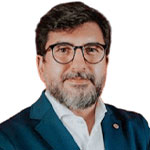 Álvaro Elúa Samaniego
Profesor de Historia y actualidad Nacional
Professor of National History and current affairs
Licenciado en Periodismo y Comunicación por la Universidad San Pablo CEU. Cuenta además con un Máster en Administración y Dirección de Empresas. Ha desarrollado la mayor parte de su carrera profesional en medios de comunicación audiovisuales, especialmente en la Televisión de Castilla y León, donde ha sido presentador de informativos y programas y delegado en Madrid de CyLTV. Desde esa posición ha cubierto la información política y parlamentaria en los últimos 7 años.
Elúa es especialista en Marketing Digital por The Valley Bussines School y participa en el programa ‘After Work’, de Capital Radio, como experto en comunicación.Ha sido galardonado en dos ocasiones con el Premio Cossío de Periodismo, otorgado por la Junta de Castilla y León. Ha obtenido, además, el premio de periodismo de la Fundación del Patrimonio Histórico de Castilla y León. Actualmente es director general de la consultora de comunicación PUENTIA.
Álvaro Elúa Samaniego
Profesor de Historia y actualidad Nacional
Professor of National History and current affairs
Licenciado en Periodismo y Comunicación por la Universidad San Pablo CEU. Cuenta además con un Máster en Administración y Dirección de Empresas. Ha desarrollado la mayor parte de su carrera profesional en medios de comunicación audiovisuales, especialmente en la Televisión de Castilla y León, donde ha sido presentador de informativos y programas y delegado en Madrid de CyLTV. Desde esa posición ha cubierto la información política y parlamentaria en los últimos 7 años.
Elúa es especialista en Marketing Digital por The Valley Bussines School y participa en el programa ‘After Work’, de Capital Radio, como experto en comunicación.Ha sido galardonado en dos ocasiones con el Premio Cossío de Periodismo, otorgado por la Junta de Castilla y León. Ha obtenido, además, el premio de periodismo de la Fundación del Patrimonio Histórico de Castilla y León. Actualmente es director general de la consultora de comunicación PUENTIA.
 Diego Miguel Fernández Muñoz
Profesor de Periodismo Especializado II (Deportes)
Professor of Specialized Journalism II (Sports)
Licenciado en Ciencias de la Información. Periodista deportivo. Más de 15 años de experiencia en el sector; desde agosto de 2008 responsable de la información del Real Madrid. Cobertura de pretemporadas futbolísticas (Irlanda, Los Ángeles, Shanghai, Nueva York, Melbourne, …), finales de Copa de Europa (Lisboa 2014, Milán 2016, Cardiff 2017, Kiev 2018 y Paris 2022), Mundial de Clubes (Marrakech 2014, Yokohama 2016, Abu Dhabi 2018), cinco finales de Copa del Rey, partidos de Liga, Champions League y Supercopa de España Jeddah 2020. Desde mayo de 2012, responsable de la información de la Selección Española de Fútbol.
Diego Miguel Fernández Muñoz
Profesor de Periodismo Especializado II (Deportes)
Professor of Specialized Journalism II (Sports)
Licenciado en Ciencias de la Información. Periodista deportivo. Más de 15 años de experiencia en el sector; desde agosto de 2008 responsable de la información del Real Madrid. Cobertura de pretemporadas futbolísticas (Irlanda, Los Ángeles, Shanghai, Nueva York, Melbourne, …), finales de Copa de Europa (Lisboa 2014, Milán 2016, Cardiff 2017, Kiev 2018 y Paris 2022), Mundial de Clubes (Marrakech 2014, Yokohama 2016, Abu Dhabi 2018), cinco finales de Copa del Rey, partidos de Liga, Champions League y Supercopa de España Jeddah 2020. Desde mayo de 2012, responsable de la información de la Selección Española de Fútbol.
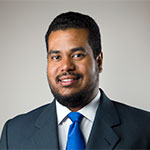 Luis Armando García Segura
Profesor de Desarrollo del espíritu participativo y solidario- Derechos Humanos
Professor of Development of the participatory and supportive spirit - Human Rights
Doctor en Derecho por la Universidad Antonio de Nebrija. Licenciado en Derecho por la Pontificia Universidad Católica Madre y Maestra de Santo Domingo en el año 2007, Cum Laude y Máster en Derecho Empresarial por la Universidad de Nebrija. Ha trabajado tanto para el sector público como privado en temas de educación y Derecho. Forma parte del equipo de Asesoría Jurídica de la Universidad Nebrija, además de ser coordinador académico del Máster en Comunicación Estratégica para gobiernos e instituciones públicas. Es abogado ejerciente del Ilustre Colegio de Abogados de Madrid (ICAM) y miembro académico de la American Bar Association (ABA) de Estados Unidos de América.
Luis Armando García Segura
Profesor de Desarrollo del espíritu participativo y solidario- Derechos Humanos
Professor of Development of the participatory and supportive spirit - Human Rights
Doctor en Derecho por la Universidad Antonio de Nebrija. Licenciado en Derecho por la Pontificia Universidad Católica Madre y Maestra de Santo Domingo en el año 2007, Cum Laude y Máster en Derecho Empresarial por la Universidad de Nebrija. Ha trabajado tanto para el sector público como privado en temas de educación y Derecho. Forma parte del equipo de Asesoría Jurídica de la Universidad Nebrija, además de ser coordinador académico del Máster en Comunicación Estratégica para gobiernos e instituciones públicas. Es abogado ejerciente del Ilustre Colegio de Abogados de Madrid (ICAM) y miembro académico de la American Bar Association (ABA) de Estados Unidos de América.
 Raquel Gómez González
Profesora de Desarrollo de competencias profesionales I, II y III
Professor of Development of professional skills I, II and III
Licenciada en Psicología por la UCM, Máster en RRHH por el Centro de Estudios y Formación Empresarial Garrigues & Andersen, Coach Certificada por AECOP Y EMCC, y Licensed Master Practitioner of Neuro-Linguistic Programming (PNL). Más de 15 años trabajando con el capital humano de las organizaciones, tanto en selección y contratación, como en formación, me han enseñado que lo que hace que alguien destaque es su actitud y capacidad para gestionar situaciones complejas. Actualmente Coordinadora y Formadora del Instituto Nebrija de Competencias Profesionales, comparto con los alumnos mi experiencia, para que entrenen y desarrollen las competencias y habilidades que el futuro profesional les va a exigir para alcanzar el éxito.
Raquel Gómez González
Profesora de Desarrollo de competencias profesionales I, II y III
Professor of Development of professional skills I, II and III
Licenciada en Psicología por la UCM, Máster en RRHH por el Centro de Estudios y Formación Empresarial Garrigues & Andersen, Coach Certificada por AECOP Y EMCC, y Licensed Master Practitioner of Neuro-Linguistic Programming (PNL). Más de 15 años trabajando con el capital humano de las organizaciones, tanto en selección y contratación, como en formación, me han enseñado que lo que hace que alguien destaque es su actitud y capacidad para gestionar situaciones complejas. Actualmente Coordinadora y Formadora del Instituto Nebrija de Competencias Profesionales, comparto con los alumnos mi experiencia, para que entrenen y desarrollen las competencias y habilidades que el futuro profesional les va a exigir para alcanzar el éxito.
 Marta González Caballero
Tutora Académica de Evaluación del desarrollo de las capacidades en la empresa
Academic Tutor for Evaluation of the development of capabilities in the company
Doctora en Comunicación Audiovisual por la UCM. Acreditada por ANECA y Licenciada en Ciencias de la Información por la misma Universidad. Diplomada en el CAP por la Facultad de Ciencias de la Educación, con especialización en Didáctica de los medios audiovisuales. Profesora Universitaria desde 1998, ha realizado su labor docente en universidades públicas y privadas y en la Escuela de Cinematografía y del Audiovisual de la Comunidad de Madrid (ECAM). Ha trabajado como operadora de cámara en el Congreso de los Diputados y en los Servicios informativos de TVE. Ha desarrollado gran parte de su experiencia profesional en el ámbito de la producción audiovisual para “M&m Producciones”, realizando piezas publicitarias, videoclips y proyectos multimedia. Desde hace dos años, colabora con el Estudio de diseño Dynarange como Audiovisual Manager en Organización de eventos. Ha realizado colaboraciones para Editorial Scriptum y para JC Libros de cine.
Marta González Caballero
Tutora Académica de Evaluación del desarrollo de las capacidades en la empresa
Academic Tutor for Evaluation of the development of capabilities in the company
Doctora en Comunicación Audiovisual por la UCM. Acreditada por ANECA y Licenciada en Ciencias de la Información por la misma Universidad. Diplomada en el CAP por la Facultad de Ciencias de la Educación, con especialización en Didáctica de los medios audiovisuales. Profesora Universitaria desde 1998, ha realizado su labor docente en universidades públicas y privadas y en la Escuela de Cinematografía y del Audiovisual de la Comunidad de Madrid (ECAM). Ha trabajado como operadora de cámara en el Congreso de los Diputados y en los Servicios informativos de TVE. Ha desarrollado gran parte de su experiencia profesional en el ámbito de la producción audiovisual para “M&m Producciones”, realizando piezas publicitarias, videoclips y proyectos multimedia. Desde hace dos años, colabora con el Estudio de diseño Dynarange como Audiovisual Manager en Organización de eventos. Ha realizado colaboraciones para Editorial Scriptum y para JC Libros de cine.
 Jesús Manuel González Lorenzo
Profesor de Edición y Montaje
Professor of Editing and Editing
Doctor en Creatividad por la Facultad de Bellas Artes de la Universidad Complutense de Madrid (2016), Licenciado en Comunicación Audiovisual por la Universidad Pontificia de Salamanca (2000). Su trayectoria profesional y científica está orientada al análisis de las cualidades expresivas de los medios y tecnologías de la comunicación y su impacto en los usuarios en ámbitos educativos y creativos. Su experiencia laboral se ha desarrollado a lo largo de diecisiete años como realizador y editor en canales de televisión, como Antena 3, Canal +, Comedy Central o Cuatro, entre otros. Participó en el equipo que pondría en marcha en el grupo Sogecable (Actual Prisa TV) los primeros servicios de contenidos audiovisuales en telefonía móvil y web en España. Ha compaginado su trabajo en los medios con la docencia, adquiriendo así una doble visión de las posibilidades comunicativas y expresivas de los medios desde diferentes perspectivas teórico-prácticas, experimentales y científicas.
Jesús Manuel González Lorenzo
Profesor de Edición y Montaje
Professor of Editing and Editing
Doctor en Creatividad por la Facultad de Bellas Artes de la Universidad Complutense de Madrid (2016), Licenciado en Comunicación Audiovisual por la Universidad Pontificia de Salamanca (2000). Su trayectoria profesional y científica está orientada al análisis de las cualidades expresivas de los medios y tecnologías de la comunicación y su impacto en los usuarios en ámbitos educativos y creativos. Su experiencia laboral se ha desarrollado a lo largo de diecisiete años como realizador y editor en canales de televisión, como Antena 3, Canal +, Comedy Central o Cuatro, entre otros. Participó en el equipo que pondría en marcha en el grupo Sogecable (Actual Prisa TV) los primeros servicios de contenidos audiovisuales en telefonía móvil y web en España. Ha compaginado su trabajo en los medios con la docencia, adquiriendo así una doble visión de las posibilidades comunicativas y expresivas de los medios desde diferentes perspectivas teórico-prácticas, experimentales y científicas.
 Alicia Gracia Morales
Profesora de Industrias de la comunicación
Profesora de Industrias de la comunicación
Licenciada en Periodismo por la UCAM de Murcia, es Máster en Periodismo en Televisión por la Escuela CES. Actualmente desarrolla su actividad profesional en el área de programas de RTVE, en Prado del Rey en donde desarrolla labores de redacción y reporterismo para el programa Corazón de TVE. Anteriormente ha ejercido como redactora y editora web en rtve.es y como redactora de informativos en Los Desayunos de TVE, la edición matinal del telediario de TVE y en la primera y segunda edición del informativo. Tiene experiencia en el mundo radiofónico, en donde ha dirigido programas especializados en el sector primario en emisoras de economía y finanzas, como Capital Radio y anteriormente en Radio Intereconomía.
Alicia Gracia Morales
Profesora de Industrias de la comunicación
Profesora de Industrias de la comunicación
Licenciada en Periodismo por la UCAM de Murcia, es Máster en Periodismo en Televisión por la Escuela CES. Actualmente desarrolla su actividad profesional en el área de programas de RTVE, en Prado del Rey en donde desarrolla labores de redacción y reporterismo para el programa Corazón de TVE. Anteriormente ha ejercido como redactora y editora web en rtve.es y como redactora de informativos en Los Desayunos de TVE, la edición matinal del telediario de TVE y en la primera y segunda edición del informativo. Tiene experiencia en el mundo radiofónico, en donde ha dirigido programas especializados en el sector primario en emisoras de economía y finanzas, como Capital Radio y anteriormente en Radio Intereconomía.
 Nicolás Grijalba de la Calle
Director del Departamento de comunicación / Profesor de Medios, Arte y Cultura
Director of the Department of Communication / Professor of Media, Art and Culture
Doctor en Comunicación Audiovisual (Universidad Complutense). Licenciado en Periodismo por la Universidad Antonio de Nebrija. Máster en Práctica Escénica y Cultura Visual (UCLM – Museo Reina Sofía). Experiencia en distintos medios como Televisión Española, La Gaceta (Cultura), Servimedia…, y en diferentes revistas culturales. Compagina la docencia con la participación en congresos, seminarios y talleres, en proyectos informativos y culturales y como organizador de eventos y promotor cultural. Conocimientos de interpretación y dramatización en escuelas de teatro como la Cuarta Pared (Madrid). En 2013 estrena su primera obra de teatro (Pareidolia). Coordinador de la ‘Ruta Fílmica’ del festival Filmadrid (2016-2019).
Nicolás Grijalba de la Calle
Director del Departamento de comunicación / Profesor de Medios, Arte y Cultura
Director of the Department of Communication / Professor of Media, Art and Culture
Doctor en Comunicación Audiovisual (Universidad Complutense). Licenciado en Periodismo por la Universidad Antonio de Nebrija. Máster en Práctica Escénica y Cultura Visual (UCLM – Museo Reina Sofía). Experiencia en distintos medios como Televisión Española, La Gaceta (Cultura), Servimedia…, y en diferentes revistas culturales. Compagina la docencia con la participación en congresos, seminarios y talleres, en proyectos informativos y culturales y como organizador de eventos y promotor cultural. Conocimientos de interpretación y dramatización en escuelas de teatro como la Cuarta Pared (Madrid). En 2013 estrena su primera obra de teatro (Pareidolia). Coordinador de la ‘Ruta Fílmica’ del festival Filmadrid (2016-2019).
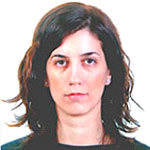 Begoña Gutiérrez Fuentes
Profesora de Sociología
Professor of Sociology
Doctora en Ciencias de la Información por la Universidad Complutense de Madrid (Premio Extraordinario de Doctorado). Acreditada como Profesora Ayudante Doctora por la Agencia Nacional de Evaluación de la Calidad y la Acreditación (ANECA). Es licenciada en Comunicación Audiovisual (Universidad de Valencia) y Máster en Periodismo Multimedia Profesional (UCM). Ha realizado una estancia de investigación en The University of Texas at Austin (Department of Radio-Television-Film). Cuenta con experiencia docente en grado y máster. Ha publicado artículos científicos en revistas con alto factor de impacto como Jazz Research Journal, Revista Mediterránea de Comunicación y Fonseca Journal of Communication, entre otras. Es miembro oficial del grupo de investigación Análisis del texto audiovisual (ATAD) de la UCM y Jefa de Estudios del Centro de Educación Superior Next, adscrito a la Universidad de Lleida.
Begoña Gutiérrez Fuentes
Profesora de Sociología
Professor of Sociology
Doctora en Ciencias de la Información por la Universidad Complutense de Madrid (Premio Extraordinario de Doctorado). Acreditada como Profesora Ayudante Doctora por la Agencia Nacional de Evaluación de la Calidad y la Acreditación (ANECA). Es licenciada en Comunicación Audiovisual (Universidad de Valencia) y Máster en Periodismo Multimedia Profesional (UCM). Ha realizado una estancia de investigación en The University of Texas at Austin (Department of Radio-Television-Film). Cuenta con experiencia docente en grado y máster. Ha publicado artículos científicos en revistas con alto factor de impacto como Jazz Research Journal, Revista Mediterránea de Comunicación y Fonseca Journal of Communication, entre otras. Es miembro oficial del grupo de investigación Análisis del texto audiovisual (ATAD) de la UCM y Jefa de Estudios del Centro de Educación Superior Next, adscrito a la Universidad de Lleida.
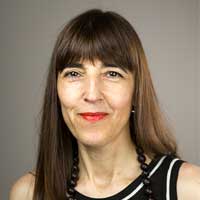 Mercedes Herrero de la Fuente
Profesora investigadora de Mundo Contemporáneo
Research Professor of Contemporary World
Doctora en CC. de la Información por la Universidad Complutense de Madrid y profesora acreditada por la ACAP. Ha sido profesora asociada en la Universidad Nebrija, donde ha impartido las asignaturas de Producción en TV, Producción Audiovisual y Periodismo Internacional. Ha colaborado también con los programas de postgrado de varias universidades, entre ellas la UCM y la Universidad Camilo José Cela, además de la propia Universidad Nebrija, donde fue profesora en la primera edición del máster de Periodismo en TV. Ha sido coordinadora del título de experto Información Internacional y Países del Sur (UCM). De su experiencia profesional fuera del ámbito académico destaca su trabajo como productora en los servicios informativos de TELEMADRID, donde ha participado en todas las grandes coberturas informativas de los últimos años y ha producido numerosos programas, como el espacio de debate "Madrid-Princesa Opina" o el institucional "En Pleno Madrid".
Mercedes Herrero de la Fuente
Profesora investigadora de Mundo Contemporáneo
Research Professor of Contemporary World
Doctora en CC. de la Información por la Universidad Complutense de Madrid y profesora acreditada por la ACAP. Ha sido profesora asociada en la Universidad Nebrija, donde ha impartido las asignaturas de Producción en TV, Producción Audiovisual y Periodismo Internacional. Ha colaborado también con los programas de postgrado de varias universidades, entre ellas la UCM y la Universidad Camilo José Cela, además de la propia Universidad Nebrija, donde fue profesora en la primera edición del máster de Periodismo en TV. Ha sido coordinadora del título de experto Información Internacional y Países del Sur (UCM). De su experiencia profesional fuera del ámbito académico destaca su trabajo como productora en los servicios informativos de TELEMADRID, donde ha participado en todas las grandes coberturas informativas de los últimos años y ha producido numerosos programas, como el espacio de debate "Madrid-Princesa Opina" o el institucional "En Pleno Madrid".
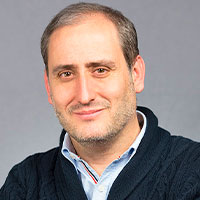 Carlos Jiménez Narros
Profesor de Diseño periodístico
Professor of Newspaper Design
Doctor por la Universidad Complutense de Madrid. Profesor acreditado por la ACAP. Periodista con experiencia profesional en La Voz del Tajo, Radio Arco Iris y As. Además, ha trabajado en las revistas especializadas: PC Actual, Elektor, Deliberación, Games/consolas y Redes Lan, entre otras. Su trayectoria profesional está centrada en el diseño gráfico, técnicas de autoedición y proyectos de preimpresión y ha diseñado imágenes corporativas y proyectos gráficos para empresas e instituciones. Desde 1994 es profesor de la Universidad Antonio de Nebrija. Es autor de ponencias y comunicaciones en distintos congresos internacionales sobre comunicación, diseño y enseñanza. Su área de investigación está centrada en el diseño gráfico, nuevas tecnologías e innovación docente.
Carlos Jiménez Narros
Profesor de Diseño periodístico
Professor of Newspaper Design
Doctor por la Universidad Complutense de Madrid. Profesor acreditado por la ACAP. Periodista con experiencia profesional en La Voz del Tajo, Radio Arco Iris y As. Además, ha trabajado en las revistas especializadas: PC Actual, Elektor, Deliberación, Games/consolas y Redes Lan, entre otras. Su trayectoria profesional está centrada en el diseño gráfico, técnicas de autoedición y proyectos de preimpresión y ha diseñado imágenes corporativas y proyectos gráficos para empresas e instituciones. Desde 1994 es profesor de la Universidad Antonio de Nebrija. Es autor de ponencias y comunicaciones en distintos congresos internacionales sobre comunicación, diseño y enseñanza. Su área de investigación está centrada en el diseño gráfico, nuevas tecnologías e innovación docente.
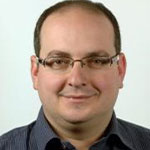 Juan José Marcos Guillén
Profesor de Fundamentos de Economía
Professor of Fundamentals of Economics
Licenciado en Periodismo por la Universidad San Pablo CEU. Más de 20 años trabajando en información económica. En la actualidad, jefe de la sección de Economía y Política en el diario especializado Expansión. Anteriormente desempeñó labores periodísticas en la edición valenciana de El Mundo, desde donde tuvo un mayor acercamiento al mundo de las pymes y los emprendedores. Además, ha completado su formación con un MA en European Journalism organizado por la Cardiff Uninersity, Aarhus University y Utrrecht Hogschool, así como el Programa de Desarrollo Directivo de Esade, y diversos cursos de especialización económica.
Juan José Marcos Guillén
Profesor de Fundamentos de Economía
Professor of Fundamentals of Economics
Licenciado en Periodismo por la Universidad San Pablo CEU. Más de 20 años trabajando en información económica. En la actualidad, jefe de la sección de Economía y Política en el diario especializado Expansión. Anteriormente desempeñó labores periodísticas en la edición valenciana de El Mundo, desde donde tuvo un mayor acercamiento al mundo de las pymes y los emprendedores. Además, ha completado su formación con un MA en European Journalism organizado por la Cardiff Uninersity, Aarhus University y Utrrecht Hogschool, así como el Programa de Desarrollo Directivo de Esade, y diversos cursos de especialización económica.
 Laura Martínez Otón
Profesora de Taller de Radio
Professor of Radio Workshop
Profesora e Investigadora en el grupo Innomedia de la Universidad Nebrija. Doctora en Comunicación por CEINDO. Licenciada en Periodismo por la Universidad CEU San Pablo. Ha desarrollado su carrera profesional en el Grupo COPE desde 1995: Cadena 100 y Cadena COPE como redactora, locutora y productora. Ha sido coordinadora de política, editora de informativos y boletines, reportera de sociedad en informativos, locutora y redactora del Fin de Semana COPE. Ha trabajado junto a Carlos Herrera, Ernesto Saenz de Buruaga, Angel Expósito, Javi Nieves o Cristina Lopez Schlichting entre otros. Ha colaborado en diferentes medios como ABC, Europa Press y 13 TV. IX Premio “Lolo” a su trayectoria periodística. I Premio de radio Grupo Norte contra la Violencia de Género.
Laura Martínez Otón
Profesora de Taller de Radio
Professor of Radio Workshop
Profesora e Investigadora en el grupo Innomedia de la Universidad Nebrija. Doctora en Comunicación por CEINDO. Licenciada en Periodismo por la Universidad CEU San Pablo. Ha desarrollado su carrera profesional en el Grupo COPE desde 1995: Cadena 100 y Cadena COPE como redactora, locutora y productora. Ha sido coordinadora de política, editora de informativos y boletines, reportera de sociedad en informativos, locutora y redactora del Fin de Semana COPE. Ha trabajado junto a Carlos Herrera, Ernesto Saenz de Buruaga, Angel Expósito, Javi Nieves o Cristina Lopez Schlichting entre otros. Ha colaborado en diferentes medios como ABC, Europa Press y 13 TV. IX Premio “Lolo” a su trayectoria periodística. I Premio de radio Grupo Norte contra la Violencia de Género.
 Sissy Melisa Teves Romero
Profesora de Lenguas Modernas
Professor of Modern Languages
Graduada en Filología Inglesa y licenciada en Traducción e Interpretación por la Universidad Ricardo Palma. Máster en Estudios Literarios y Culturales Británicos por la UAM, donde se encuentra realizando el doctorado en Estudios Artísticos, Literarios y de la Cultura. Cuenta con una amplia experiencia docente. En el ámbito de la enseñanza de idiomas, ha trabajado como profesora de inglés y español como lengua extranjera en diversas instituciones públicas y privadas en Perú, España y Bélgica. Asimismo, ha impartido clases de estudios de género y literatura tanto en inglés como en español. Cuenta con numerosas comunicaciones en congresos nacionales e internacionales. Sus campos de investigación incluyen teoría postcolonial, estudios de género y literatura inglesa del siglo XVIII. También le interesan las nuevas tecnologías aplicadas a la enseñanza de lenguas modernas, la comunicación intercultural y el aprendizaje basado en proyectos.
Sissy Melisa Teves Romero
Profesora de Lenguas Modernas
Professor of Modern Languages
Graduada en Filología Inglesa y licenciada en Traducción e Interpretación por la Universidad Ricardo Palma. Máster en Estudios Literarios y Culturales Británicos por la UAM, donde se encuentra realizando el doctorado en Estudios Artísticos, Literarios y de la Cultura. Cuenta con una amplia experiencia docente. En el ámbito de la enseñanza de idiomas, ha trabajado como profesora de inglés y español como lengua extranjera en diversas instituciones públicas y privadas en Perú, España y Bélgica. Asimismo, ha impartido clases de estudios de género y literatura tanto en inglés como en español. Cuenta con numerosas comunicaciones en congresos nacionales e internacionales. Sus campos de investigación incluyen teoría postcolonial, estudios de género y literatura inglesa del siglo XVIII. También le interesan las nuevas tecnologías aplicadas a la enseñanza de lenguas modernas, la comunicación intercultural y el aprendizaje basado en proyectos.
 Ángel Negro Rodríguez
Profesor de Redacción Periodística en medios audiovisuales
Professor of Journalism Writing in audiovisual media
Licenciado en Periodismo por la Universidad Complutense de Madrid. Obtuvo el Premio Extraordinario Fin de Carrera en el año 2010. Master en Periodismo en Televisión Antena 3 por la Universidad Antonio de Nebrija. Tras pasar por la Cadena Ser, Radio Nacional o La Crónica de León, desde enero de 2011 desarrolla su actividad profesional en Antena 3 Noticias, primero en la sección de Economía, actualmente en la sección de Nacional, donde realiza reportajes, conexiones en directo y crónicas de ambiente. Ha viajado a Francia o Suecia como reportero y ha cubierto, entre otros acontecimientos, jornadas electorales y congresos políticos. Además de su labor profesional, actualmente es alumno del Master en Gestión de Empresas Audiovisuales impartido en la EAE Business School.
Ángel Negro Rodríguez
Profesor de Redacción Periodística en medios audiovisuales
Professor of Journalism Writing in audiovisual media
Licenciado en Periodismo por la Universidad Complutense de Madrid. Obtuvo el Premio Extraordinario Fin de Carrera en el año 2010. Master en Periodismo en Televisión Antena 3 por la Universidad Antonio de Nebrija. Tras pasar por la Cadena Ser, Radio Nacional o La Crónica de León, desde enero de 2011 desarrolla su actividad profesional en Antena 3 Noticias, primero en la sección de Economía, actualmente en la sección de Nacional, donde realiza reportajes, conexiones en directo y crónicas de ambiente. Ha viajado a Francia o Suecia como reportero y ha cubierto, entre otros acontecimientos, jornadas electorales y congresos políticos. Además de su labor profesional, actualmente es alumno del Master en Gestión de Empresas Audiovisuales impartido en la EAE Business School.
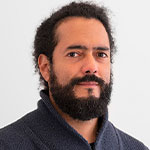 Leonardo La Rosa Barrolleta
Profesor de Nuevas tecnologías y sociedad de la información / New technologies and the information society
Professor of New technologies and the information society / New technologies and the information society
Leonardo La Rosa Barrolleta
Profesor de Nuevas tecnologías y sociedad de la información / New technologies and the information society
Professor of New technologies and the information society / New technologies and the information society
 David Ramos Pascual
Profesor de Redacción y edición en medios digitales
Professor of writing and editing in digital media
Doctor en Periodismo por la Universidad Complutense de Madrid. Redactor Jefe en Cadena SER y co-director del Master de Radio Cadena SER - Nebrija. Antes Redactor Jefe Digital de Deportes en Cadena SER, Senior News Editor en El Huffington Post, Editor General de Contenidos en Telefónica Digital para los proyectos Terra España e Invertia, Editor de Portada de RTVE.es y Jefe de Sección Web en 20minutos. También ha trabajado en Radio Marca, Agencia Efe, Europa Press y MTG España. Experiencia docente como profesor de periodismo digital, nuevas tecnologías de la información y tratamiento de contenidos multimedia en la Universidad Carlos III de Madrid, Instituto RTVE, Centro Universitario Villanueva y Universidad Europea de Madrid.
David Ramos Pascual
Profesor de Redacción y edición en medios digitales
Professor of writing and editing in digital media
Doctor en Periodismo por la Universidad Complutense de Madrid. Redactor Jefe en Cadena SER y co-director del Master de Radio Cadena SER - Nebrija. Antes Redactor Jefe Digital de Deportes en Cadena SER, Senior News Editor en El Huffington Post, Editor General de Contenidos en Telefónica Digital para los proyectos Terra España e Invertia, Editor de Portada de RTVE.es y Jefe de Sección Web en 20minutos. También ha trabajado en Radio Marca, Agencia Efe, Europa Press y MTG España. Experiencia docente como profesor de periodismo digital, nuevas tecnologías de la información y tratamiento de contenidos multimedia en la Universidad Carlos III de Madrid, Instituto RTVE, Centro Universitario Villanueva y Universidad Europea de Madrid.
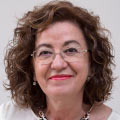 Juana Rubio Romero
Profesora de Trabajo Fin de Grado
Professor of Final Degree Project
Licenciada en Psicología. Doctora en Filosofía. Profesora Doctora Acreditada. Profesora e investigadora en la Facultad de Comunicación y Artes desde 1996. Su especialización son los Métodos de Investigación y la Psicología aplicados a la comunicación y al consumo. Experiencia profesional en investigación social y de mercado. Ha ejercido en diversos puestos de responsabilidad como investigadora cualitativista para Institutos de Investigación, Agencias de Publicidad y clientes directos. Ha dirigido durante cinco años el Curso de Investigación en Marketing, que organiza AEDEMO. Ha participado en numerosos congresos nacionales e internaciones, como ponente y formando parte del comité organizador. Sus publicaciones más relevantes son documentos técnicos de investigación social.
Juana Rubio Romero
Profesora de Trabajo Fin de Grado
Professor of Final Degree Project
Licenciada en Psicología. Doctora en Filosofía. Profesora Doctora Acreditada. Profesora e investigadora en la Facultad de Comunicación y Artes desde 1996. Su especialización son los Métodos de Investigación y la Psicología aplicados a la comunicación y al consumo. Experiencia profesional en investigación social y de mercado. Ha ejercido en diversos puestos de responsabilidad como investigadora cualitativista para Institutos de Investigación, Agencias de Publicidad y clientes directos. Ha dirigido durante cinco años el Curso de Investigación en Marketing, que organiza AEDEMO. Ha participado en numerosos congresos nacionales e internaciones, como ponente y formando parte del comité organizador. Sus publicaciones más relevantes son documentos técnicos de investigación social.
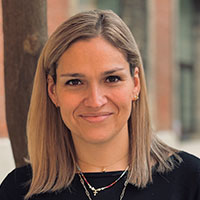 Marta Saavedra Llamas
Profesora de Métodos de investigación en comunicación
Professor of Research Methods in Communication
Doctora en Ciencias de la Información por la Universidad Complutense de Madrid. Profesora acreditada por ANECA. Realizó en la misma universidad el postgrado “Comunicación bursátil y sectores financieros” y la Licenciatura en Periodismo. En el área profesional ha trabajado como redactora en los periódicos regionales El faro de Murcia y El diario de Murcia y en los económicos El nuevo Lunes, Dirigentes y Nuestros Negocios. De 2008 a 2010 fue redactora jefe de estas dos últimas publicaciones y del confidencial Dirigentesdigital.com. Cuenta con experiencia en el ámbito de la comunicación institucional, habiendo formado parte del equipo de la Agencia de Calidad, Acreditación y Prospectiva de las Universidades de Madrid (ACAP), donde trabajó anteriormente en el área de acreditación del profesorado. Actualmente, es directora de la revista NUESTRA (Universidad Nebrija).
Marta Saavedra Llamas
Profesora de Métodos de investigación en comunicación
Professor of Research Methods in Communication
Doctora en Ciencias de la Información por la Universidad Complutense de Madrid. Profesora acreditada por ANECA. Realizó en la misma universidad el postgrado “Comunicación bursátil y sectores financieros” y la Licenciatura en Periodismo. En el área profesional ha trabajado como redactora en los periódicos regionales El faro de Murcia y El diario de Murcia y en los económicos El nuevo Lunes, Dirigentes y Nuestros Negocios. De 2008 a 2010 fue redactora jefe de estas dos últimas publicaciones y del confidencial Dirigentesdigital.com. Cuenta con experiencia en el ámbito de la comunicación institucional, habiendo formado parte del equipo de la Agencia de Calidad, Acreditación y Prospectiva de las Universidades de Madrid (ACAP), donde trabajó anteriormente en el área de acreditación del profesorado. Actualmente, es directora de la revista NUESTRA (Universidad Nebrija).
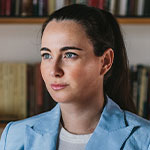 María Salinas Vázquez
Profesora de Periodismo Especializado I
Professor of Specialized Journalism I
Licenciada en Periodismo por la Universidad de Sevilla. Master en Gestión de Empresas Audiovisuales. Técnico en Protocolo y Organización de Eventos. Experto en Gestión Comercial y Desarrollo de Negocio. Desde 2009 realiza labor como docente en el Master Emprendedores Comunicación y Moda y Curso de Experto en Diseño de Espacios Comerciales de la Universidad de Sevilla, Master y Comunicación de Moda de Cámara de Comercio de Sevilla. Co-organizadora del Curso de Verano Branding de Moda de la Universidad de Cádiz, así como docente en los Cursos Fashion Maganement, y Organización de Eventos de la institución privada Corporate Fashion Worlwide. Quince años dedicada a la creación, desarrollo e implementación de estrategias de márketing y comunicación en empresas del sector retail moda.
María Salinas Vázquez
Profesora de Periodismo Especializado I
Professor of Specialized Journalism I
Licenciada en Periodismo por la Universidad de Sevilla. Master en Gestión de Empresas Audiovisuales. Técnico en Protocolo y Organización de Eventos. Experto en Gestión Comercial y Desarrollo de Negocio. Desde 2009 realiza labor como docente en el Master Emprendedores Comunicación y Moda y Curso de Experto en Diseño de Espacios Comerciales de la Universidad de Sevilla, Master y Comunicación de Moda de Cámara de Comercio de Sevilla. Co-organizadora del Curso de Verano Branding de Moda de la Universidad de Cádiz, así como docente en los Cursos Fashion Maganement, y Organización de Eventos de la institución privada Corporate Fashion Worlwide. Quince años dedicada a la creación, desarrollo e implementación de estrategias de márketing y comunicación en empresas del sector retail moda.
 Borja Sanchez Trillo
Profesor de Fotoperiodismo
Photojournalism Professor
Licenciado en Periodismo y doctorando en Ciencias de la Información por la Universidad Complutense de Madrid. A lo largo de sus 15 años como fotoperiodista ha centrado su actividad profesional en España y Asia Sus fotografías han sido publicadas por los medios más prestigiosos del mundo como The New York Times, The Telegraph, Le Monde, The Guardian, CNN, The Washington Post, Time Newsweek Sports Illustrated, etc. Ha desarrollado su carrera profesional tanto en agencias de noticias (Cordon Press, Getty,) AFP como periódicos (South China Morning Post, La Gaceta de los Negocios, Sankei Shimbun) y magazines (Tiempo, Al Jazeera Magazine, The Guardian Magazine).
Borja Sanchez Trillo
Profesor de Fotoperiodismo
Photojournalism Professor
Licenciado en Periodismo y doctorando en Ciencias de la Información por la Universidad Complutense de Madrid. A lo largo de sus 15 años como fotoperiodista ha centrado su actividad profesional en España y Asia Sus fotografías han sido publicadas por los medios más prestigiosos del mundo como The New York Times, The Telegraph, Le Monde, The Guardian, CNN, The Washington Post, Time Newsweek Sports Illustrated, etc. Ha desarrollado su carrera profesional tanto en agencias de noticias (Cordon Press, Getty,) AFP como periódicos (South China Morning Post, La Gaceta de los Negocios, Sankei Shimbun) y magazines (Tiempo, Al Jazeera Magazine, The Guardian Magazine).Actualmente trabaja como stringer para la agencia americana Getty Images.
 Celia Sancho Belinchon
Profesora de Gestión de comunidades virtuales
Professor of Virtual Community Management
Doctora en Comunicación. Responsable de Comunicación Digital de Ciudadanos en la Asamblea de Madrid. Gestión de equipo, redes sociales y estrategia de comunicación online. (enero 2020-junio 2021) - Responsable RRSS GP Ciudadanos en Congreso de los Diputados. Desde abril 2017 hasta diciembre 2019. - Ponente en el I Congreso Nacional de Jóvenes Investigadores de la Comunicación (9 mayo 2016) - Publicación de un capítulo de libro “Claves de la comunicación para niños y adolescentes” (2015) - Impartición de clases en el Master de Comunicación social en la Facultad de Ciencias de la Información.
Celia Sancho Belinchon
Profesora de Gestión de comunidades virtuales
Professor of Virtual Community Management
Doctora en Comunicación. Responsable de Comunicación Digital de Ciudadanos en la Asamblea de Madrid. Gestión de equipo, redes sociales y estrategia de comunicación online. (enero 2020-junio 2021) - Responsable RRSS GP Ciudadanos en Congreso de los Diputados. Desde abril 2017 hasta diciembre 2019. - Ponente en el I Congreso Nacional de Jóvenes Investigadores de la Comunicación (9 mayo 2016) - Publicación de un capítulo de libro “Claves de la comunicación para niños y adolescentes” (2015) - Impartición de clases en el Master de Comunicación social en la Facultad de Ciencias de la Información.
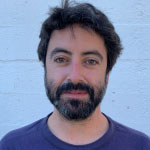 Mario Sanz Pascual
Profesor de Cámara
Professor of Camera
Licenciado por la Universidad Camilo José Cela en el año 2004.
Desde Marzo 2018 hasta hoy, clases y conferencias impartidas para A3MEDIA
FORMACIÓN. “El operador de cámara”
Desde Junio de 2009 operador de cámara y edición para INFORMATIVOS A3. Casa
Real y noticias de toda índole por todo el mundo. Operador de LiveU.
ENG oficial de Presidencia del Gobierno entre 2011 y 2014 para Antena3.
De 2007 a 2009 trabajos como ENG para AGENCIA ATLAS, TELE5, CUATRO, TVE y
TELEMADRID. Operador de cámara y edición de video. Informativos y otros
programas de las diferentes cadenas.
De 2005 operador de cámara Wescam y Cineflex desde helicóptero para IIC.
Mario Sanz Pascual
Profesor de Cámara
Professor of Camera
Licenciado por la Universidad Camilo José Cela en el año 2004.
Desde Marzo 2018 hasta hoy, clases y conferencias impartidas para A3MEDIA
FORMACIÓN. “El operador de cámara”
Desde Junio de 2009 operador de cámara y edición para INFORMATIVOS A3. Casa
Real y noticias de toda índole por todo el mundo. Operador de LiveU.
ENG oficial de Presidencia del Gobierno entre 2011 y 2014 para Antena3.
De 2007 a 2009 trabajos como ENG para AGENCIA ATLAS, TELE5, CUATRO, TVE y
TELEMADRID. Operador de cámara y edición de video. Informativos y otros
programas de las diferentes cadenas.
De 2005 operador de cámara Wescam y Cineflex desde helicóptero para IIC.
 Francisco José Suárez Rodríguez
Profesor de Taller de televisión
Television Workshop professor
Doctor en Periodismo por la Universidad Complutense. Profesional de los medios de comunicación desde el año 1985 ha trabajado en los diarios El Mundo y Sport de Barcelona. En radio ha formado parte de la redacción de deportes de Antena 3 de radio y televisión. Tras un breve paso por Telecinco, desde 1998 es miembro de la redacción de los Servicios Informativos de Antena 3 Televisión. Ha trabajado en los gabinetes de comunicación del Real Madrid y del grupo Volkswagen.
En su trayectoria docente ha sido profesor en la Universidad Francisco de Vitoria y Camilo José Cela. Desde el curso 2009/10 es profesor del Máster de Periodismo en Televisión (Antena 3) de la Universidad Antonio de Nebrija.
Ha participado en congresos tanto nacionales como internacionales en los que ha presentado ponencias y es autor de varios capítulos de libros de investigación sobre las nuevas tecnologías.
Francisco José Suárez Rodríguez
Profesor de Taller de televisión
Television Workshop professor
Doctor en Periodismo por la Universidad Complutense. Profesional de los medios de comunicación desde el año 1985 ha trabajado en los diarios El Mundo y Sport de Barcelona. En radio ha formado parte de la redacción de deportes de Antena 3 de radio y televisión. Tras un breve paso por Telecinco, desde 1998 es miembro de la redacción de los Servicios Informativos de Antena 3 Televisión. Ha trabajado en los gabinetes de comunicación del Real Madrid y del grupo Volkswagen.
En su trayectoria docente ha sido profesor en la Universidad Francisco de Vitoria y Camilo José Cela. Desde el curso 2009/10 es profesor del Máster de Periodismo en Televisión (Antena 3) de la Universidad Antonio de Nebrija.
Ha participado en congresos tanto nacionales como internacionales en los que ha presentado ponencias y es autor de varios capítulos de libros de investigación sobre las nuevas tecnologías.
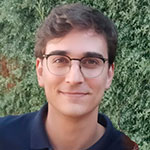 Mario Toledo Ros
Profesor de Redacción Periodística II
Professor of Journalistic Writing II
Graduado en Periodismo por la Universidad Antonio de Nebrija y Máster en Edición y Gestión Editorial por la Universidad Internacional de Valencia. Actualmente es redactor de ahoraqueleo.com, la web de libros de laSexta, medio de comunicación al que se incorpora en 2016. También ha trabajado en el programa ‘laSexta Columna’ y en los informativos de fin de semana y de diario.
Mario Toledo Ros
Profesor de Redacción Periodística II
Professor of Journalistic Writing II
Graduado en Periodismo por la Universidad Antonio de Nebrija y Máster en Edición y Gestión Editorial por la Universidad Internacional de Valencia. Actualmente es redactor de ahoraqueleo.com, la web de libros de laSexta, medio de comunicación al que se incorpora en 2016. También ha trabajado en el programa ‘laSexta Columna’ y en los informativos de fin de semana y de diario.
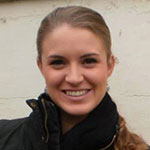 Carmen Torres Narváez
Profesora de Dirección de Comunicación
Professor of Communication Management
Doctora en Ciencias de la Información por la Universidad Complutense de Madrid. Es licenciada en Periodismo, Comunicación Audiovisual, Publicidad y Relaciones Públicas (Universidad Nebrija).
En la actualidad es responsable de relaciones institucionales del Espacio Iberoamericano del Conocimiento en la Secretaría General Iberoamericana (SEGIB), organismo responsable de las Cumbres Iberoamericanas de Jefes de Estado y de Gobierno.
De 2014 a 2017 dirigió la comunicación institucional de la Organización de Estados Iberoamericanos para la Educación, la Ciencia y la Cultura (OEI), organismo intergubernamental público que agrupa 23 países a ambos lados del Atlántico.
Carmen Torres Narváez
Profesora de Dirección de Comunicación
Professor of Communication Management
Doctora en Ciencias de la Información por la Universidad Complutense de Madrid. Es licenciada en Periodismo, Comunicación Audiovisual, Publicidad y Relaciones Públicas (Universidad Nebrija).
En la actualidad es responsable de relaciones institucionales del Espacio Iberoamericano del Conocimiento en la Secretaría General Iberoamericana (SEGIB), organismo responsable de las Cumbres Iberoamericanas de Jefes de Estado y de Gobierno.
De 2014 a 2017 dirigió la comunicación institucional de la Organización de Estados Iberoamericanos para la Educación, la Ciencia y la Cultura (OEI), organismo intergubernamental público que agrupa 23 países a ambos lados del Atlántico.
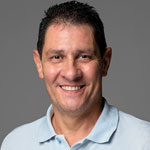 Antonio Vaquerizo Mariscal
Profesor de Ética y Deontología
Professor of Ethics and Deontology
Doctor en Ciencias de la Información por la UCM (departamento de Historia de la Comunicación Social). Periodista con 30 años de experiencia; ha desarrollado su labor profesional entre otros medios en: Antena 3 Televisión, Telemadrid, Intereconomía y Movistar Plus, entre otros.
Antonio Vaquerizo Mariscal
Profesor de Ética y Deontología
Professor of Ethics and Deontology
Doctor en Ciencias de la Información por la UCM (departamento de Historia de la Comunicación Social). Periodista con 30 años de experiencia; ha desarrollado su labor profesional entre otros medios en: Antena 3 Televisión, Telemadrid, Intereconomía y Movistar Plus, entre otros.
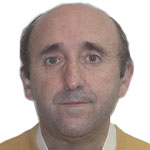 Antonio Francisco Velasco Sanz
Profesor de Derecho de la información
Information Law Professor
Doctor en Derecho Constitucional por la UNED. Licenciado en Ciencias de la Información por la Universidad Complutense de Madrid. Licenciado en Derecho por la Universidad Nacional de Educación a Distancia (UNED). Ex director de comunicación de la Fiscalía General del Estado. Jefe de sección de Tribunales del diario ‘La Razón’. Participante y ponente habitual de la tertulia de análisis político del canal 24 horas de TVE.
Antonio Francisco Velasco Sanz
Profesor de Derecho de la información
Information Law Professor
Doctor en Derecho Constitucional por la UNED. Licenciado en Ciencias de la Información por la Universidad Complutense de Madrid. Licenciado en Derecho por la Universidad Nacional de Educación a Distancia (UNED). Ex director de comunicación de la Fiscalía General del Estado. Jefe de sección de Tribunales del diario ‘La Razón’. Participante y ponente habitual de la tertulia de análisis político del canal 24 horas de TVE.
More Academic Information
Official Degree:Bachelor's Degree in Journalism
Those interested in studying and obtaining a degree in Journalism from the Antonio de Nebrija University must be inquisitive and eager to tell of what is happening in the world, in any existing media. The Degree in Journalism is geared towards inquisitive people with critical judgement, seeking to learn and understand and to go beyond everyday events. People familiar with the latest technological tools, capable of adapting quickly to new content creation and management processes.
240 créditos.
Minimum 12 ECTS and maximum 90 ECTS per registration and academic period
Center responsible:School of Communication and Arts
Branch of knowledge: Social and Legal Sciences
Available places: 45
Type of Education: Classroom attendance
Academic year in which it was implemented: 2013-2014
Languages: Spanish / English
University Services: [+info]
Competences
Specífic Competences- Learn and understand the key concepts of Communication, Business, Law, IT, History, Economics, Sociology and Modern Languages as topics that influence and interact with communications in general and journalism especially.
- Design, plan and write news items, applying the most appropriate journalistic genre and the procedures and methods required in each case.
- Use voice and gesture appropriately on radio and television programmes.
- Understand the features of institutional, corporate and business communication so as to be able to provide information consistently with protocol requirements through appropriate media and in a context of fluid relations with media professionals.
- Understand the business structure of the media of communication and the history and development of the various models of multimedia groups.
- Communicate current affairs in language suited to each medium (print press, photography, radio, television).
- Understand photographic technique, its history and development, and its use in news reporting.
- Understand the fundamentals of journalistic style, structure, genre, techniques, sources and conditions that shape current affairs reporting.
- Write journalistic texts effectively in different styles and genres.
- Design and edit digital content.
- Understand the functioning of the various sections of any medium of communication.
- Find novel topics and approaches in each area of specialisation.
- Correctly use the language, jargon and sources specific to each area of specialisation.
- Apply knowledge acquired while in training to the practical challenges of professional life.
- Submit and defend a project of one's own.
- Understand the key concepts of composition, typography and colour as applied to journalistic design.
- Apply a sense of proportion by ordering information in accordance with its news value.
- Identify and manage content and formats on social media and online communities.
- Carry out the role of a press officer or communications director and manage press office or public relations unit.
- Create and implement radio news programmes.
- Create and implement new features and documentaries.
- Explain the background to conflict analysis and international cooperation.
- Show good command of spoken and written English. Students must at least achieve level B2.
- Show good command of spoken and written Spanish.
- Apply theoretical knowledge to an understanding of reality and to solving specific problems in the Social Sciences, especially in the realm of Communications.
- Compile, discriminate and categorise information from bibliographical and documentary sources.
- Show critical and self-critical capabilities.
- Correctly handle new communication technologies.
- Apply ingenuity and creativity, especially in communicative processes.
- Acquire an ethical commitment to the job, with an awareness of media law, especially as it applies to the professional practice of a journalist.
- Manage time effectively when framing communication plans and news projects.
- Show the ability to work in a team and develop interpersonal relationships while creating communication projects.
- Evaluate, make decisions and plan communication strategies.
- Transmit information, issues, ideas and solutions to both specialised and non-specialised audiences in the realm of Communication.
- Show the ability to lead and manage projects effectively, while abiding by the principles of social responsibility.
- Implement a Social Science research process, from the hypothesis stage to final conclusions.
- Gather and interpret data, apply critical reasoning, and arrive at a conclusion.
- Develop learning skills and an awareness of one's own abilities and resources so as later to take action with a high degree of autonomy.
- Show social sensibility when doing professional and/or academic work, abiding by Spanish and European law, codes of good practice, self-regulation standards, gender equality, the special needs of people with disabilities, child protection and, in general, the principles contained in the Spanish Constitution and the values inherent in the culture of peace.
- Develop the necessary personal attitudes and skills in the media and business worlds to join the job market and enhance one's maturity with a view to subsequent learning life stages.
- Apply innovative and dynamic techniques to managing work, projects and teams.
- Develop and demonstrate initiative and an entrepreneurial spirit.
- Apply the skills acquired in the course of the training programme.
- Solve problems as they emerge when constructing messages and implementing communication and information processes.
Online Study
Calendar and schedules
Calendar
Schedules
Access and Admision
4.2.2 Admission Criteria
At the Antonio de Nebrija University, the admission procedures established by university legislation will be carried out with particular reference to the guiding principles of access to Spanish university studies: equality, merit, ability, universal accessibility and adjustment to the criteria of the European Higher Education Area .
Ways and deadlines for submitting admission applications.
In order to apply for admission to any official university Bachelor's degree studies at this University, it will be necessary to complete the corresponding application for admission through the University website, or request it at any of the university campuses, within the deadlines established by the Department of University Development.
Documentation necessary for admission to Bachelor's degree studies.
a) Students with University Entrance Exams (from Baccalaureate and university entrance exams for people over 25 years of age): Those who have taken the University Entrance Exams must provide:
- Copy of ID card (DNI) or supporting document.
- Document with grades obtained in the University Entrance Exams.
- Academic record of grades obtained in high school.
- Record Transfer Fees stamped by the Registrar's Office of the University in which the university entrance exam was taken.
b) Students who have Baccalaureate degrees, diplomas or studies from educational systems of Member States of the European Union, or from other States with which international agreements applicable in this regard have been signed, on a reciprocal basis. Graduates of European Baccalaureate or International Baccalaureate.
- Copy of Passport or supporting document.
- Credentials of compliance with the requirements issued by the UNED (Spanish Open University) or by the body to be determined.
- Document with grades obtained in the University Entrance Exams, if applicable.
- Accreditation of B2 level in Spanish, in the case of students whose nationality does not correspond to Spanish-speaking countries.
c) Students from Advanced Vocational Training programs, Second-year Vocational Training programs: These students must provide:
- Copy of ID card (DNI) or supporting document.
- Academic record indicating the grades obtained, and the final numerical grade.
- Diploma, or receipt of having paid the diploma issuance fees.
- Where appropriate, a document stating the result of the Specific Phase of the University Entrance Exams.
d) University graduates:
- Copy of ID card (DNI) or supporting document.
- Academic record with the grades of each of the subjects taken and the final grade average.
- Diploma, or receipt of having paid the diploma issuance fees.
In the case of students with homologated foreign degrees, they must provide the following documentation:
- Copy of Passport, ID card (DNI) or supporting document.
- Homologation of the university degree.
- Equivalences of grade average of studies carried out in foreign centers.
- Accreditation of B2 level in Spanish, in the case of students whose nationality does not correspond to Spanish-speaking countries.
e) Students from previous educational plans who have not taken the general phase of the University Entrance Exams, regulated in Royal Decree 1892/2008, of November 14:
- Students from the COU (university preparation courses) prior to the 1974-75 academic year, and students who have passed the Higher Baccalaureate with the State exam: copy of DNI, grade book and the grade card of the specific phase of the University Entrance Exams, if applicable.
- Students who have passed the Higher Baccalaureate, PREU (university preparatory course) and the Maturity test: copy of DNI, grade book, Maturity test card and grade card of the specific phase of the University Access Tests, if applicable.
f) Students with partial recognition of foreign studies:
These students must submit the following documentation, translated and officially legalized, if applicable:
- Recognition application form.
- Copy of Passport or supporting document.
- Academic record accrediting the level and type of studies carried out, issued by the corresponding official Center, stating, at least, the following information: subjects taken, credits or workload for each subject, grades and table or scale for grades.
- Curriculum or table of subjects of the degree to which the subjects being recognized belong, expressly indicating the duration of those studies in academic years and the subjects that comprise it, and with the original stamp of the Center of origin, or failing that, the documentation requested in the credit recognition procedure.
- Programs of the subjects, with details of the content and scope (hours and credits) with which they have been taken, and with the original stamp of the Center of origin or, failing that, the documentation requested in the credit recognition procedure.
- Accreditation of B2 level in Spanish, in the case of students whose nationality does not correspond to a Spanish-speaking country.
- Equivalences of grade averages of studies carried out in foreign centers.
i) Students requesting admission due to change of university and/or studies. Students from other Universities must submit the following documentation:
- Copy of ID card (DNI) or supporting document.
- Copies stamped by the university of origin of the official content and competences programs, or teaching guides, of the different subjects the student passed or, failing that, the documentation requested in the credit recognition procedure.
- Academic record of university studies started, with grade average over 10, in accordance with the provisions of Royal Decree 1125/2003 (BOE 09/18/2003).
- Photocopy of the BOE issue in which the curriculum of the degree being taken was published.
j) Access to the University for people over 45 years old.
- Copy of ID card (DNI) or supporting document.
- Certificate that accredits the passing of the Access Test for People over 45 years of age (test is taken at the Antonio de Nebrija University).
k) Access to the University for people over 40 years old.
- Copy of ID card (DNI) or supporting document
- Positive report after assessment at the Antonio de Nebrija University of all the requirements established in Art. 16 RD 412/2014.
Only the applications of those students who have submitted the required documentation within the deadlines established by the Admissions Department will be processed. In addition, the student will be asked for all the additional information that is considered appropriate in order to know the candidate's suitability for the Bachelor's degree.
Admission Tests
For the purposes of pre-admission and admission, the assessment of the candidate will be done with a scale of 0 to 10 points, taking into account the following criteria and percentages:
Academic record of the student's path of origin: 60%
Multiple-choice psychotechnical test: Assessment 5%
This test consists of a personality evaluation test that explores the emotional, intellectual, social areas, as well as norms and values of each candidate student of the Bachelor's Degree in Journalism at the Antonio de Nebrija University.
English level test: Assessment 5%
In addition to the competences established in the Bachelor's Degree in Journalism, one has been included that is relative to the adequate knowledge of the English language, both oral and written. The English level tests consist of a written exam with multiple-choice questions, on oral and written comprehension. They are taken in person or online, and are held in computer rooms on each campus, with professors from the Institute of Modern Languages. Depending on the results of this test, the student will be placed at his/her corresponding level.
It will not be necessary for the candidate to take the language placement test if they submit a document that proves their level of English. The accreditation of the level will be validated through the official degrees established by the table of certificates accepted by ACLES. Valid for one year. Students taking degrees in which subjects are taught in English must have an accredited B2 level in that language.
Specific test of knowledge about the Bachelor’s Degree in Journalism. Assessment 10%.
This test is multiple-choice and consists mainly of specific contents of some of the main areas of general knowledge (Communication and Journalism) that are going to be studied in the degree chosen by the candidate, in addition to other elements common to all degrees.
Personal interview. Assessment 20%.
As a strategy to know the characteristics of the applicants, the academic department will try to determine if the candidate has sufficient motivation, education and knowledge, abilities, aptitudes, communication skills, extracurricular activities and future interests necessary to be admitted as a student in the Bachelor's Degree in Journalism at the Antonio de Nebrija University.
The Admissions Commission will meet according to needs and will communicate the result of the admission to the candidate by email, telephone and letter so that they can proceed to enroll.
Once the student has been admitted, they will proceed to enroll, which consists of the following phases:
Place reservation
Candidates must reserve their place. This economic pre-enrollment guarantees the candidate's place at the University. This fee will not be returned except for students who are admitted conditionally, or do not exceed the legal requirements for access, or for justified medical reasons.
Enrollment
Pre-enrolled candidates who wish to formalize their academic enrollment at the University must, within the indicated deadlines, follow these steps:
1.- Submit documentation: certify that they meet the requirements established by Spanish university legislation in order to start university studies.
2.- Formalize the enrollment process online: The self-enrollment service on the Nebrija website allows admitted students to carry out all academic, financial and administrative procedures within the established deadlines. For this, they will receive, along with their admission letter, the access code and personal password necessary to be able to carry out their self-enrollment. Once the self-enrollment is formalized, the candidate acquires the status of student of Nebrija University.
Conditional enrollment in Bachelor's degree studies
Students with non-university foreign studies pending homologation may be admitted to the University subject to compliance with the requirements established by current regulations. Once the homologation process has been resolved, the student must submit the documentation that accredits it. If they do not do so, their admission and enrollment, as well as the exams taken, where appropriate, will not be valid.
Maximum and minimum number of enrollment credits in Bachelor's degree studies
Students will be able to enroll:
In Bachelor's degree studies, from 45 ECTS credits to a maximum of 90 ECTS credits per academic year, in the case of full-time study, and from a minimum 12 ECTS credits to less than 45 ECTS credits for those who study part-time.
The management of the Academic Department may authorize enrollment in a different number of credits for exceptional reasons.
Modification of enrollment
Enrollment modification is understood to be any change that occurs in a student's enrollment.
If the student, having been enrolled in a certain degree, subject, or program, decides to change his/her enrollment, he/she must request it by writing to the Registrar's Office for authorization. Said requests must be approved by the Academic Department.
A maximum period of 15 days is established after the effective start of the academic year and/or the second semester to request these changes. After this deadline, the student will not be able to make changes to his/her enrollment.
If the number of applicants exceeds the number of places offered, the student's academic record will be taken as an admission criterion (grade average).
Therefore, anyone interested in accessing the Bachelor's degree in Journalism must submit, without exception, their academic record, since its grade average will be what decides their admission to the Bachelor's degree, in the event that the number of applications exceeds to the number of places offered.
Once all places are full, if there are more people interested in accessing, they will be put on the waiting list for possible vacancies that may arise before the start of the academic year, in which the admission and selection criteria detailed in point 4 for the rest of applicants will be applied.
Employability
Career Opportunities
The teaching team of the Faculty of Communication and Arts is made up of professionals from each field of specialization, who develop a teaching method based on the conviction that what we learn, we learn by doing it.
Integration with the profession is based on the incorporation of professionals as associate professors who endorse each program, in a teaching methodology inspired by the learning by doing proposition that indexes the experiential aspect in the classroom and in academic extension activities.
The Bachelor's Degree in Journalism has a collaboration agreement with some of the best companies and institutions in the sector, such as La Sexta, Antena 3, Agencia EFE or Mediaset España, where students can complete their professional practices and thus obtain a first experience demanding job.
The Bachelor's Degree in Journalism trains young people whose professional future will be like:
- Editor/staff writer for print press, radio, television and online media
- Graphical editor
- Reporter
- Presenter
- Correspondent
- Press office member
- Corporate communications officer
- Communications Director
- Press attaché at embassies and international bodies
- Online content editor
- Community manager/website administrator
- Multimedia researcher and document specialist
Employability recognized in the Rankings
The commitment of Nebrija University to the academic requirement, training in leading companies and institutions, innovation in multidisciplinary programs and international projection, places the University in the top positions of the most important rankings.
The International Ranking QS Stars awards Nebrija University the maximum score in the quality and satisfaction of students in teaching, employability of the graduates and the internationalization of the institution.
The national rankings also recognize Nebrija University as the first Spanish university in teaching and second in employability, highlighting its performance in research, knowledge transfer and internationalization.
The Bologna Declaration formalized the principles on which the European Higher Education Area should be based: quality, mobility, diversity, competitiveness and employment growth.
From this, Nebrija stands as an academic model of reference, educating students with excellent individual behavior, interaction with their environment and motivated by and for constant and continuous training. The Nebrija Institute of Professional Skills works every day to achieve the differentiation of our students through the development of attitudes and skills.
The main objective is for students to achieve the best of themselves through the development and empowerment of their personal skills and resources through personal self-knowledge.
In addition, some of the professional skills that are worked on within the three seminars are those related to interpersonal skills and active communication skills and negotiation, indispensable for our students to know how to transmit ideas, to argue them, to provide information and opinions in an adequate, clear and convincing way.
Within what will be their work performance, other aspects such as teamwork, conflict resolution and project management ability will be worked on.
In the third block, skills worked on are those aimed at increasing the student's employability. They will work with tools and techniques for job searching, and perform tasks that achieve in the student a greater use of their personal skills.
For all this we have currently active experts in selection of people, professionals dedicated to personal and professional training and professionals dedicated to the world of communication and the arts.
In this way, and in a complementary way to his/her specific training, we help the student create a differentiating pattern in the social and business environment in which he/she will be immersed when he/she finishes his/her studies.
International
The International Mobility Office of the Universidad Antonio de Nebrija monitors agreements with leading universities worldwide on an ongoing basis.
Students have the option of spending a year or a semester of study at another leading university in the European Union, North America, Latin America or Asia. This option will widen your view of the world, let you exchange ideas and experiences with students in other countries, enhance your language skills, and help you prepare to perform your profession to the highest standard anywhere in the world.
Communication and Arts students have the option of pursuing studies at the following foreign universities:
NOTE: The destination universities, offered by degree, may vary according to the International Mobility Program. For more information, students can consult the information online in the. International Mobility Program.
The information published here is for guidance only and may be subject to modification.
Your degree in Journalism

Live Journalism
The aim of the Degree in Journalism is to train professionals who master journalistic narrative and have the technological skills and capabilities required to be a good journalist in any media: journalists who analyse and anticipate, with the accuracy, depth and ethics to verify facts and data, accredit sources, provide a forum for different voices and opinions, build interesting information and be loyal to their own conscience.
Manu Carreño: “A good journalist is the one who asks, the one who insists on asking and continues to ask questions in a free society”
“Look for the reason for everything without forgetting the responsibility of contrasting the news, the first commandment of journalism. After this, according to him, come other important traits for professional performance: reaping enthusiasm, making accurate directs, having an excellent pen, being a brilliant reporter and chronicler, having fun and enjoying the journey."
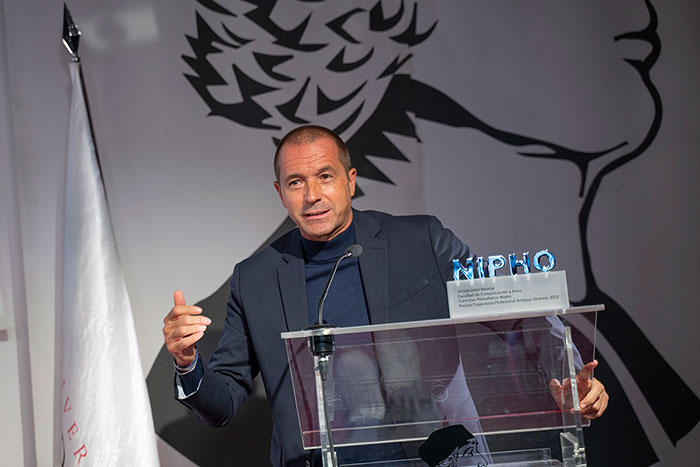
The Internet is a key information tool for journalists and communication professionals and an increasingly established platform for media work. The following websites can help you stay up-to-date with world affairs in general, and can be an aid for language queries specifically.
Spain's leading daily newspapers
- ABC www.abc.es
- El Mundo www.elmundo.es
- El País www.elpais.es
- La Razón www.larazon.es
- La Vanguardia www.lavanguardia.es
- El Economista www.eleconomista.es
- El Español www.elespanol.com
- El Diario www.eldiario.es
- El Huffington Post www.huffingtonpost.es
- Expansión www.expansion.com
- El Confidencial www.elconfidencial.com/
- La información www.lainformacion.com/
- 20 Minutos www.20minutos.es
- As www.as.com
- Marca www.marca.com
International online dailies and magazines
Leading radio and TV stations online
Other Links
- Agencia de Noticias EFE www.efe.es
- Agencia de Noticias Europa Press www.europapress.es
- Asociación de la Prensa de Madrid www.apmadrid.es
- Ayuda en el uso del idioma español www.fundeu.es
- Catálogo de Información pública de la Administración General del Estado datos.gob.es/datos/
- Guía del Ocio www.guiadelocio.com
- Real Academia de la Lengua Española www.rae.es
Vicente Vallés: “Wherever there is a lack of analysis, there is no freedom”
“Journalism is not only about telling what happened, but also why it happened. Journalists must analyze the news, this is what we can provide in quality. Wherever there is a lack of analysis, there is no freedom.” This was one of the concepts that Vicente Vallés, director and news anchor of the second edition of Antena 3 Noticias, spoke of on stage at the Nebrija University auditorium after receiving the NIPHO Professional Career Award. The NIPHO awards, which have had twelve editions, are organized by the Department of Communication of the School of Communication and Arts.
15th Edition of the NIPHO Awards
Nebrija University honored journalists Encarna Samitier, director of 20minutos, with the Professional Career award, and Javier Chicote, head of Research at ABC, with the Alumni Professional Career award, during the Nipho 2024 Awards ceremony. In addition to recognizing these accomplished professionals, this fifteenth edition also celebrated outstanding journalistic works by university students in categories including Press, Photography, Radio, Television, Digital, and Data Journalism.

CLABE, the future of media under debate
o Nebrija University hosted the conference on the future of media, organized by CLABE (Club Abierto de Editores), which addressed topics of interest such as fake news, disinformation and the application of artificial intelligence in Journalism.
Ver noticia
Fake news and social networks in the teaching field
Fake news is one of the greatest challenges facing humanity in our time of information overload. Laura Martínez Otón, director of the Master's Degree in Radio, Podcast and Digital Audio – Cadena SER, addresses this topic, which is as interesting as it is necessary, in her latest book, presented at Nebrija University.
See article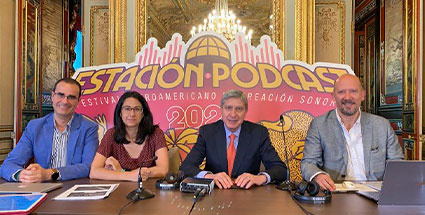
Digital audio and podcasts in Spain
The study 'How podcasts sound in Spain. In-depth analysis of the original production on digital audio platforms in 2022', carried out by the Nebrija Observatory of Spanish, has analyzed the current situation of podcasting in Spain.
See newsCommunication Week
At Nebrija University, we celebrate #NebrijaFCA Week every year. The first day of the Communication and Arts Week held the visit of Risto Mejide, the #NebrijaFashionArte exhibition and the radio marathon.
Reporters Without Borders Week
RSF Week in Nebrija: Threatened Journalism, organized by Nebrija University with Reporters Without Borders held a conference, organized by the School of Communication and Arts, under the title: Latin America: a journalism abyss.
Live program "Hoy por Hoy" of Cadena Ser
Students of Nebrija University's Master's Degree in Continuing Education in Radio, Podcast and Digital Audio have started the year with the live broadcast of Hoy por hoy. Cadena SER's morning show directed and presented by Àngels Barceló was broadcast from the Nebrija University library.
"Hora 14" live from Nebrija University
Live radio returns to Nebrija University. One year after the broadcast of Hoy por Hoy, Cadena SER brings its news program Hora 14 to the Madrid-Princesa Campus
See news



